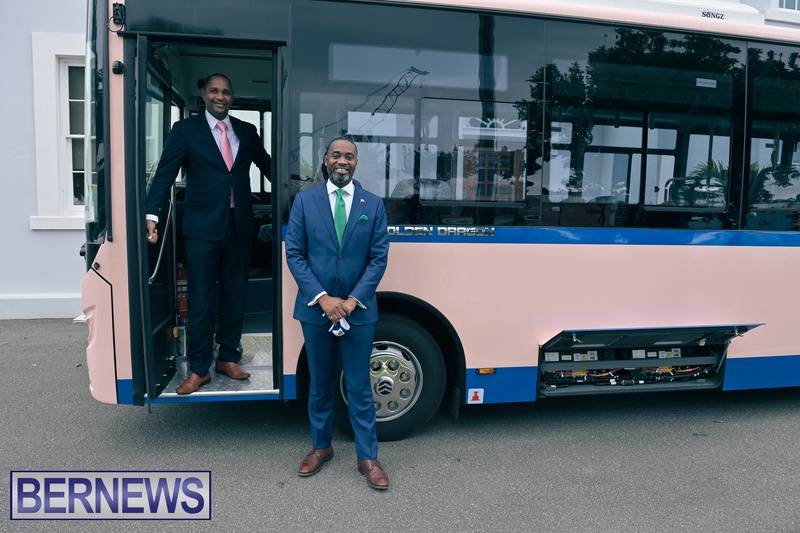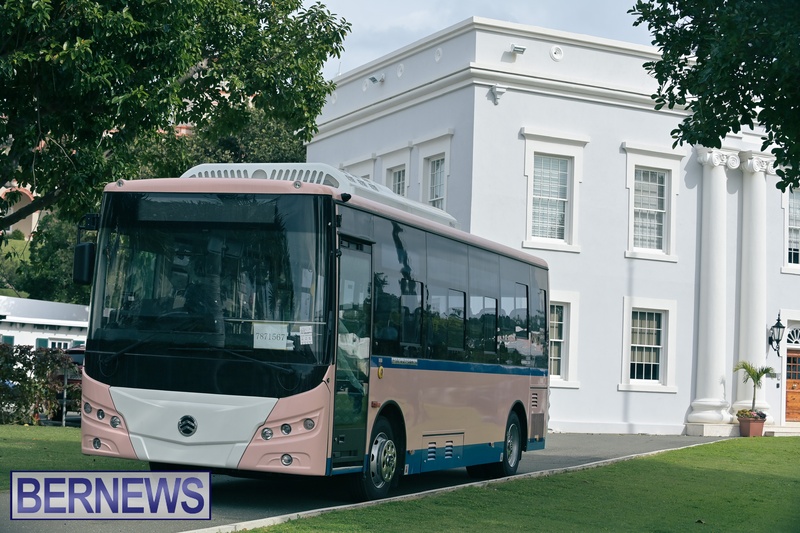Minister Scott: Update On New Electric Buses
The lower cost of the new electric buses “supports faster replenishment of the public bus fleet,” Minister of Transport Lawrence Scott said in the House of Assembly today [Feb 18], adding that while we have “not reached the point where we can eliminate cancellations” they “do not anticipate mass cancellations, as we have seen over the last 12 to 24 months.”
The Minister said, “I am excited to provide an update on our 30 new electric buses. The first 10 arrived earlier this week and were showcased to the media on Wednesday. They will be followed by two further shipments on 28 March and 4 April 2022.
“At a cost of $132,000 per bus landed in Bermuda, the Xiamen bus is approximately 60% less expensive than the current $334,000 MAN bus, a savings of BMD$202,000 per bus. The electric bus has lower fuel and maintenance cost, resulting in a savings of $353,000 per bus over its 12- year lifetime. Taking into account capital, operating and maintenance cost, the twelve-year lifecycle cost of the new electric bus is approximately 50% that of the current diesel bus. This represents an $11 million dollar savings relative to business as usual.
“The Xiamen bus is 8.05m long and 2.35m wide, as compared to the current MAN bus at 9.7m long and 2.38m wide. The smaller bus supports road safety and reduces costly accident damage. The Xiamen electric bus carries a total of 40 passengers, which is ten passengers fewer than the existing bus. The buses are airconditioned, fitted with cameras, USB charging for passengers, and there is designated priority seating for the senior citizens and persons requiring assistance. The buses have been designed to complete a full days’ work with overnight depot charging.
“Representatives from the manufacturer, Golden Dragon will be on the island for three months, from March through May 2022, to support with the commissioning of the buses and staff training. Special tooling and spare parts for the new electric fleet have been ordered and will arrive shortly. The new buses will enter into service between March and April 2022.
“I take this opportunity to advise that even after onboarding the 30 new buses, we would be short of the minimum level of resources required to provide consistent and reliable service as our traditional fleet size is 100. Unfortunately, we have not reached the point where we can eliminate cancellations, and however, we do not anticipate mass cancellations, as we have seen over the last 12 to 24 months.
“The lower cost of the new buses supports faster replenishment of the public bus fleet, which will deliver reliability and eliminate service cancellations.
The Minister’s full statement follows below:
Mr. Speaker, I am excited to provide an update on our 30 new electric buses. The first 10 arrived earlier this week and were showcased to the media on Wednesday. They will be followed by two further shipments on 28 March and 4 April 2022.
The Interim charging stations to support the new buses have also arrived and are currently being installed at Dockyard, Fort Langton, and St. George bus depots. The initial charging stations will support the new electric buses pending completion of the integrated 60-bus charging station and solar PV project at Fort Langton depot later this year.
At a cost of $132,000 per bus landed in Bermuda, the Xiamen bus is approximately 60% less expensive than the current $334,000 MAN bus, a savings of BMD$202,000 per bus. The electric bus has lower fuel and maintenance cost, resulting in a savings of $353,000 per bus over its 12- year lifetime. Taking into account capital, operating and maintenance cost, the twelve-year lifecycle cost of the new electric bus is approximately 50% that of the current diesel bus. This represents an $11 million dollar savings relative to business as usual.
Mr. Speaker, the transition to electric buses supports the government’s greening strategy by producing zero road-side emissions, resulting in improved air quality and public health. Converting the public bus fleet to electric has the carbon equivalent of removing 1,500 cars from Bermuda’s roads based on today’s BELCO generation mix, and 2,400 equivalent cars based on the 2035 generation mix as the utility transitions to renewable power generation. The Xiamen bus is 8.05m long and 2.35m wide, as compared to the current MAN bus at 9.7m long and 2.38m wide. The smaller bus supports road safety and reduces costly accident damage. The Xiamen electric bus carries a total of 40 passengers, which is ten passengers fewer than the existing bus. The buses are airconditioned, fitted with cameras, USB charging for passengers, and there is designated priority seating for the senior citizens and persons requiring assistance. The buses have been designed to complete a full days’ work with overnight depot charging. The 180kW battery has a range of 180km at full capacity with AC to 250km without AC.
Mr. Speaker, the buses will now be prepared for licensing and outfitted with DPT equipment in preparation for entering into service. Representatives from the manufacturer, Golden Dragon will be on the island for three months, from March through May 2022, to support with the commissioning of the buses and staff training. Special tooling and spare parts for the new electric fleet have been ordered and will arrive shortly. The new buses will enter into service between March and April 2022.
Mr. Speaker, the introduction of electric public buses is a transformation change in Bermuda’s public transportation. This is as big a transformation as when public buses were first introduced in Bermuda.
Mr. Speaker, I take this opportunity to advise that even after onboarding the 30 new buses, we would be short of the minimum level of resources required to provide consistent and reliable service as our traditional fleet size is 100. Unfortunately, we have not reached the point where we can eliminate cancellations, and however, we do not anticipate mass cancellations, as we have seen over the last 12 to 24 months. The lower cost of the new buses supports faster replenishment of the public bus fleet, which will deliver reliability and eliminate service cancellations.
Mr. Speaker, Bermuda is one of the leaders in the Caribbean region to transition to electric public buses. It leads the area with a higher percentage of electric buses in our fleet.
Thank You, Mr. Speaker!





Still nothing about whether these electric buses are BIU approved or what is happening to provide technical support after the Chinese representatives leave after 3 months.
Well, let’s see how the electrics busses stand up to the test of time; for the better part, a shift for the Mans’s busses was long overdue….they, for the most part, were a bad deal for the mechanical and structural performance. Could understand why had not done away with the choice and gotten Japanese buses that are far better and more reliable.